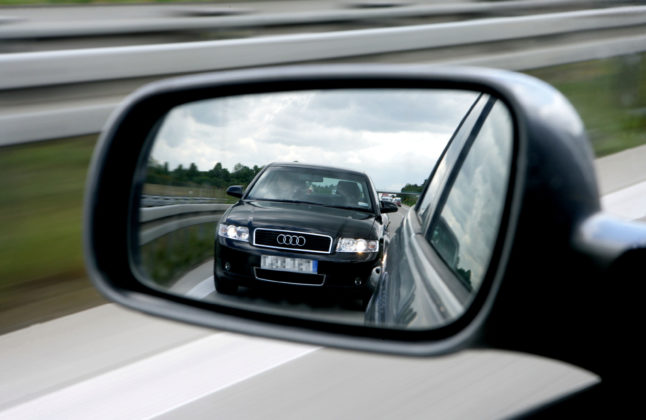1. Raising your right arm
Giving the Nazi salute – known as der Hitlergruß in German – is illegal in Germany.
The gesture, which consists of stretching the right arm diagonally upwards with a flat hand at eye level, is a criminal offence which is punishable with a jail term from three months to up to five years.
There are some exceptions to this strict law, however, which include demonstrating the salute for the purposes of an artistic performance or for educational reasons.
2. Killing wasps
However much you dislike them, killing wasps is something you should avoid at all costs in Germany.
That’s because wasps are protected by the Federal Nature Conservation Act, which states in Section 39 that it is forbidden to “wantonly disturb them or to capture, injure or kill them without reasonable cause.”

Anyone who gets caught splattering one of the buzzing critters could face a fine of up to €5,000, even for one of the more common varieties of wasps.
READ ALSO: EXPLAINED: How to deal with wasps in Germany
3. Covering your face at a demo
If you are a politically active person who likes to attend demonstrations, this is an important rule to be aware of.
In Germany there is a law called das Vermummungsverbot – a ban on face coverings at demonstrations. The purpose of the law is to ensure that the authorities can identify people in case of criminal behaviour during a protest.

Before you ask, there is an exception to the rule for face masks worn for the purpose of preventing the spread of Covid. The key thing is that the wearer is still identifiable.
4. Doing DIY on a Sunday
If you’ve just bought some shelves you want to put them up before the working week starts again, it’s best you wait until next Saturday.
That’s because the Sonntagsruhe (Sunday rest) principle is so important in Germany, that it can even be written into local rules. Each state and municipality can set its own rest periods. Your landlord will also likely write in their own rules on Ruhezeit in the house rules or Hausordnung.
That means no drilling, hammering, banging, mowing the lawn, hoovering or recycling glass bottles on Sundays.
The rule of thumb here is that the so-called room noise level may not be exceeded in closed rooms and 50 decibels outdoors.
Anyone who disturbs this peace and quiet can be hit with a fine which can amount to a three-digit sum in some cases.
In extreme situations and repeated cases, the peace-disruptor could even end up being expelled from their home by their landlord or local authority.
READ ALSO: What you need to know about ‘quiet time’ in Germany
5. Road rage
They say that words are cheap, but that’s not the case on the roads in Germany.
Insulting someone during a road traffic interaction is a criminal offence and can land road users with fines of up to €4,000.

The Bußgeldkatalog (fine catalogue) website has compiled a list of what certain insults can end up costing when said behind the wheel.
For an extended middle finger, for example, judges have imposed fines of between €600 and €4000. Calling someone a dumme Kuh (stupid cow) can cost €300 and an Idiot €1500.
Caution is also advised in the case of indirect attacks, saying: “I’d love to call you an a***hole right now” landed one driver a fine of €1,600.
READ ALSO: Driver in Bavaria gets €5,000 fine for giving the finger to speed camera
6. “Dutzing” a police officer
If you don’t know the difference between the “Sie” and “du” forms in German, now’s the time to catch up.
Though using the “du” form with a German police officer is not directly forbidden, it can be (and often will be) taken as an insult that constitutes a criminal offence under section 185 of the criminal code.
7. Jaywalking
Jaywalking, or als Fußgänger im Straßenverkehr unachtsam sein (being inattentive a pedestrian) as it’s catchily called in German, is an offence in Germany that can land you an on-the-spot fine of €5 to €10.
New drivers could even have their two-year probation period extended if caught crossing the road at a red traffic light.
8. Running out of petrol on the motorway
If you drive in Germany, make sure you don’t go on the Autobahn without enough petrol.
It’s illegal to stop on the highway in Germany without an extremely good reason and failing to put enough fuel in your car isn’t one of them.
Drivers who stop on the Autobahn for this reason for less than 3 minutes face a fine of €35 and €70 for more than 3 minutes, plus a point on their license.
Of course, if your parked car endangers other traffic and leads to an accident, the fines can get a lot more expensive.
READ ALSO: From nudity to sandwiches: The biggest culture shocks for foreigners in Germany
9. Washing your car
Depending on the state, washing your car in front of your home can land you with a hefty fine in Germany.
While there is no general ban on washing cars on private property, there is the Federal Water Resources Act (das Wasserhaushaltsgesetz) which makes it a punishable offence to contaminate groundwater.

States also have their own bylaws, which often specify more details about washing cars on private property. The states of Baden-Württemberg and North Rhine-Westphalia are particularly strict in this respect and issue fines starting from around €500.
10. Secret voice recording
Almost every mobile phone now has a voice recording and video function. But if you make a voice recording of someone in Germany without asking, you could land yourself in big trouble, as it is a criminal offence under Section 201 of the Criminal Code.
Unauthorised recording of the spoken word in non-public speaking situations is punishable regardless of the content of what is said. The law here is so strict, that even the German authorities aren’t allowed to make secret sound or image recordings to investigate a crime.




 Please whitelist us to continue reading.
Please whitelist us to continue reading.
What an incredibly paranoid and self- righteous culture Germany truly is. I am losing faith by the day in living here.